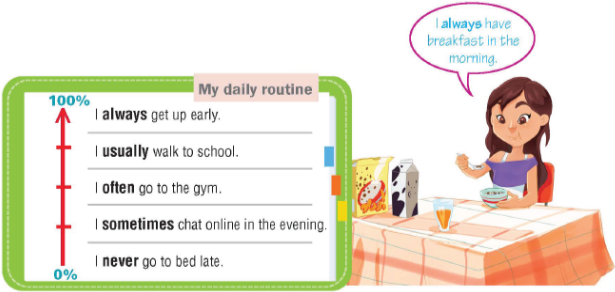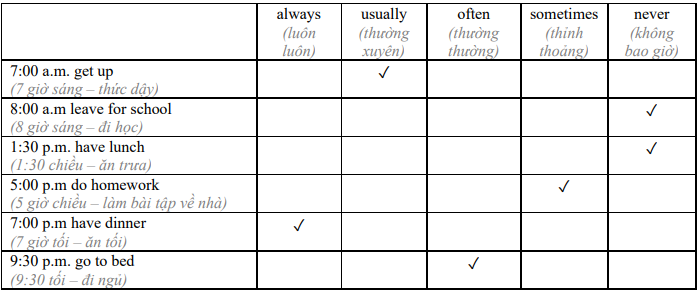2e. Grammar - Unit 2 - Tiếng Anh 6 - Right on
1. Read the theory box. Then write the correct adverb of frequency. 2. Put the words in the correct order. 3. Put a tick (✓) in the correct box. Then tell your partner. 4. Think. Imagine your friend is a famous person. What is his/ her daily routine like? 5. Read the table. Choose the correct item. Then complete the answers.
Bài 1
Video hướng dẫn giải
Advebs of frequency (Trạng từ chỉ tần suất)

I always have breakfast in the morning.
(Tôi luôn ăn sáng vào buổi sáng.)
1. Read the theory box. Then write the correct adverb of frequency.
(Đọc khung lý thuyết. Sau đó viết trạng từ chỉ tần suất đúng.)
1. John ____________ (100%) walks to school.
2. Helen ____________ (25%) watches TV in the evening.
3. They ____________ (50%) do their homework after lunch.
4. He is ____________ (0%) late for school.
5. My dad ____________ (75%) has lunch at work.
Phương pháp giải:
- always (100%): luôn luôn
- usually (75%): thường xuyên
- often (50%): thường thường
- sometimes (25%): thỉnh thoảng
- never (0%): không bao giờ
Lời giải chi tiết:
|
1. always |
2. sometimes |
3. often |
4. never |
5. usually |
(John luôn đi bộ đến trường.)
2. Helen sometimes watches TV in the evening.
(Helen thỉnh thoảng xem TV vào buổi tối.)
3. They often do their homework after lunch.
(Họ thường thì làm bài tập về nhà sau bữa trưa.)
4. He is never late for school.
(Anh ấy không bao giờ đi học muộn.)
5. My dad usually has lunch at work.
(Bố tôi thường ăn trưa tại nơi làm việc.)
Bài 2
Video hướng dẫn giải
2. Put the words in the correct order.
(Đặt các từ theo trật tự đúng.)
1. always/early/is/ for work/ He
2. She/late/ sometimes/ is
3. shower/ He / in the evening/ usually / takes/ a
4. on Sundays/ They/go/ often/to the park
Lời giải chi tiết:
1. He is always early for work.
(Anh ấy luôn đi làm sớm.)
2. She is sometimes late.
(Cô ấy thỉnh thoảng đến muộn.)
3. He usually takes a shower in the evening.
(Anh ấy thường tắm vào buổi tối.)
4. They often go to the park on Sundays.
(Họ thường đến công viên vào Chủ nhật.)
Bài 3
Video hướng dẫn giải
3. Put a tick (✓) in the correct box. Then tell your partner.
(Đánh dấu vào ô đúng. Sau đó nói với bạn của em.)

I usually get up at 7:00 a.m.
(Tôi thường thức dậy lúc 7 giờ sáng.)
Lời giải chi tiết:
- I never leave for school at 8 a.m.
(Tôi không bao giờ đi học lúc 8 giờ sáng.)
- I never have lunch at 1:30 p.m.
(Tôi không bao giờ ăn trưa lúc 1:30 chiều.)
- I sometimes do my homework at 5 p.m.
(Đôi khi tôi làm bài tập về nhà lúc 5 giờ chiều.)
- I always have dinner at 7 p.m.
(Tôi luôn ăn tối lúc 7 giờ tối.)
- I often go to bed at 9:30 p.m.
(Tôi thường đi ngủ lúc 9:30 tối.)
Bài 4
Video hướng dẫn giải
4. Think. Imagine your friend is a famous person. What is his/ her daily routine like?
(Suy nghĩ. Tưởng tượng bạn của em là một người nổi tiếng. Hoạt động thường nhật của bạn ấy như thế nào?)
Steve is a famous actor. He never gets up early. He always has a big breakfast.
(Steve là một nam diễn viên nổi tiếng. Bạn ấy chưa bao giờ dậy sớm. Bạn ấy luôn ăn sáng rất thịnh soạn.)
Lời giải chi tiết:
Messi is a famous football player. He always gets up very early to do morning exercise and go to the football practice with his team. He never skips breakfast. He usually has lunch and dinner on time. He often goes out with his team at the weekend. He sometimes goes to bed late to watch football matches on TV.
Tạm dịch:
Messi là một cầu thủ bóng đá nổi tiếng. Anh ấy luôn dậy rất sớm để tập thể dục buổi sáng và đến sân tập bóng cùng đội của mình. Anh ấy không bao giờ bỏ bữa sáng. Anh ấy thường ăn trưa và ăn tối đúng giờ. Anh ấy thường đi chơi với đội của mình vào cuối tuần. Anh ấy thỉnh thoảng đi ngủ muộn để xem các trận bóng đá trên TV.
Bài 5
Video hướng dẫn giải
Present Simple (interrogative & short answers)
|
|
interrogative |
short answers |
|
singular |
Do I/ you work? |
Yes, I/ you do. No, I/ you don’t. |
|
Does he/ she/ it work? |
Yes, he/ she/ it does. No, he/ she/ it doesn’t. |
|
|
plural |
Do we/ you/ they work? |
Yes, we/ you/ they do. No, we/ you/ they don’t. |
A: Do you like History?
(Em có thích Lịch sử không?)
B: Yes, I do.
(Em có ạ?)
C: No, I don’t.
(Em không ạ.)
5. Read the table. Choose the correct item. Then complete the answers.
(Đọc bảng. Chọn phương án đúng. Sau đó hoàn thành các câu trả lời.)
1. Do/Does you eat lunch at school? Yes,.
2. Do/Does your friends have dinner at 7:00p.m.? No, .
3. Do/Does Mary drive to work? Yes,.
4. Do/Does he have a shower in the morning? No,.
5. Do/Does you and your friends play tennis? No,.
Lời giải chi tiết:
1. Do you eat lunch at school? Yes, I do.
(Bạn có ăn trưa ở trường không? – Mình có.)
2. Do your friends have dinner at 7:00p.m.? No, they don’t.
(Bạn bè của bạn có ăn tối lúc 7:00 tối không? - Không, họ không.)
3. Does Mary drive to work? Yes, she does.
(Mary có lái xe đi làm không? Có, cô ấy có.)
4. Does he have a shower in the morning? No, he doesn’t.
(Anh ấy có tắm vào buổi sáng không? - Không, anh ấy không.)
5. Do you and your friends play tennis? No, they don’t.
(Bạn và bạn bè của bạn có chơi quần vợt không? Không, họ không.)
Bài 6
Video hướng dẫn giải
6. Form questions, then answer them.
(Thành lập câu hỏi, sau đó trả lời.)
1. Mario / like Art? (No)
A: "Does Mario like Art?” - B: "No, he doesn't."
(Mario có thích Mỹ thuật không? – Không, anh ấy không.)
2. Sandra/ have Maths on Mondays? (Yes)
3. you / watch TV after dinner? (No)
4. they have lunch at home? (Yes)
Lời giải chi tiết:
2. Does Sarah have Maths on Mondays. – Yes, she does.
(Sarah có môn Toán vào thứ Hai không? – Cô ấy có.)
3. Do you watch TV after dinner?
(Bạn có xem tivi sau bữa tối không? – Mình không.)
4. Do they have lunch at home? – Yes, they do.
(Họ có ăn trưa ở nhà không? – Họ có.)
Bài 7
Video hướng dẫn giải
7. Fill in the gaps with the Present Simple of these verbs: finish, work, have, not / go, you / get up, watch, you / do, make, play and listen. Then answer the questions.
(Điền vào chỗ trống với thì Hiện tại đơn của các động từ này: finish, work, have, not / go, you / get up, watch, you / do, make, play và listen. Sau đó trả lời các câu hỏi.)
Hi Joshua!
How are you? What time 1) __________ in the morning? I get up at 7:30 and my mum 2) __________breakfast for me and my sister, Karen. Karen is 21 __________and she 3) __________ to school. She 4) __________ in a bank. I go to school and my lessons 5) __________ at 3:00. After that I 6) __________ football in the park with my friends. Then, I do my homework. In the evening, I 7) __________to music and my sister 8) __________TV. We usually 9) __________ with our parents at 8:00. What 10) __________every day?
Write back.
Paul
1. Does Paul get up at 8:00? - No, he doesn't. He gets up at 7:30.
(Paul thức dậy lúc 8 giờ à? – Không. Anh ấy thức dậy lúc 7:30.)
2. Does Karen work in a bank?
(Karen có làm việc trong ngân hàng không?)
3. Do Paul's lessons finish at 3:00?
(Lớp học của Paul kết thúc lúc 3 giờ chiều à?)
4. Do Paul and Karen have dinner at 9:00?
(Paul và Karen ăn tối lúc 9 giờ à?)
Lời giải chi tiết:
|
1. do you get up |
2. makes |
3. doesn’t go |
|
4. works |
5. finish |
6. play |
|
7. listen |
8. watches |
9. have |
Hi Joshua!
How are you? What time do you get up in the morning? I get up at 7:30 and my mum makes breakfast for me and my sister, Karen. Karen is 21 and she doesn’t go to school. She works in a bank. I go to school and my lessons finish at 3:00. After that I play football in the park with my friends. Then, I do my homework. In the evening, I listen to music and my sister watches TV. We usually have dinner with our parents at 8:00. What do you do every day?
Write back.
Paul
2. Yes, she does.
3. Yes, they do.
4. No, they don’t.
Tạm dịch:
Chào Joshua!
Bạn khỏe không? Bạn thức dậy lúc mấy giờ vào buổi sáng? Mình thức dậy lúc 7:30 và mẹ mình làm bữa sáng cho mình và chị gái, Karen. Karen 21 tuổi và chị ấy không đi học. Chị làm việc tại một ngân hàng. Mình đi học và bài học của tôi kết thúc lúc 3:00. Sau đó, mình chơi bóng trong công viên với bạn bè của mình. Sau đó, mình làm bài tập về nhà. Vào buổi tối, mình nghe nhạc và chị gái mình xem TV. Chúng mình thường ăn tối với bố mẹ lúc 8 giờ. Bạn làm gì mỗi ngày?
Viết lại cho mình nhé.
Paul
- 2f. Skills - Unit 2 - Tiếng Anh 6 - Right on!
- CLIL (Citizenship) - Unit 2 - Tiếng Anh 6 - Right on!
- Right on! 2 - Unit 2 - Tiếng Anh 6 - Right on!
- 2. Progress check - Unit 2 - Tiếng Anh 6 - Right on!
- 2d. Everyday English - Unit 2 - Tiếng Anh 6 - Right on!
>> Xem thêm
Luyện Bài Tập Trắc nghiệm Tiếng Anh 6 - Right on! - Xem ngay













Danh sách bình luận